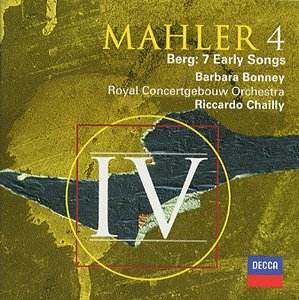MAHLER
Symphony No 4
BERG
Early Songs
 Royal Concertgebouw
Orchestra/Chailly with Barbara Bonney
(soprano)
Royal Concertgebouw
Orchestra/Chailly with Barbara Bonney
(soprano)
 Decca 466 720-2 [74
mins]
Decca 466 720-2 [74
mins]
Crotchet

For older listeners Mahler straddled the second half of the last century,
each of us with precious memories and an ongoing process of renewal and
revaluation. A virtually unknown composer during ones formative English
schooldays, discovered through Walter's Vienna recordings of Das Lied von
der Erde and the 9th Symphony, in huge piles of 78s; life was never quite
the same afterwards.
It was a long wait to hear Mahler live, with his prohibitively enormous,
costly orchestras. My first encounter with those was the 5th, soon after
the War, at the rehearsal and performance in a London theatre (the Cambridge,
I think) with the LPO, struggling manfully with this strange and demanding
music - it proved hard for their first trumpeter to get beyond the opening
call to attention to the satisfaction of Heinz Unger. At the end, he shared
his historic triumph with the composer, holding the score proudly high aloft
- a gesture which has tended to become a cliché, but felt wholly
appropriate then for that auspicious occasion, a turning point for Mahler
appreciation in UK.
After that, one 'collected' performances of the symphonies, when orchestras
(and notably the BBC) began to dare risking the cost of employing all the
extras needed to mount Mahler symphonies. One's memory must be suspect, and
I cannot remember the sequence of discovery, but the 4th (1902 - its date
belying its newness and originality), with its less gargantuan orchestra,
gradually began to be heard more regularly. It was a long time before the
tally could be completed with, I think, the 7th & 8th, the latter under
Horenstein (Decca Legends).
This brings me close to the topic under consideration, the latest recorded
4th, made in the Amsterdam Concertgebouw with the orchestra which was so
central for keeping Mahler known to the European public during a period when
we British were isolated and isolative.
From a memorable occasion in the Albert Hall, I recall the unaffected simplicity
of Elisabeth Schumann in the heavenly child's finale, direct and sharing
delight, with not a trace of archness. She may have sung nothing else on
that occasion, probably at a Prom (one has often felt pity for Mahler's vocal
soloists, when they have to sit patiently awaiting their turns late on, leaving
one wishing to have heard more from them).
This recommendable CD disposes of that problem sensibly, by coupling the
Mahler with the orchestral version (1928) of seven of Berg's romantic Early
Songs of 1907 for his future wife. (Berg idolised Mahler and in 1902 had
seized the baton with which he had premiered the Fourth as a keepsake!)
The poems are rather generalised in their nature mood-painting, but evoke
rich settings, with varied orchestrations and developing harmonic richness.
They are sung attractively by Barbara Bonney, in good voice & well recorded,
but for me are less interesting than the detailed picture of heavenly bliss
particularised verse by verse in the Knaben Wunderhorn song which ends the
Mahler, and with which the preceding movements are thematically connected,
Max Graf (1902) likening the symphony to a Hebrew Bible 'which has to be
read back to front'! CD tracking makes it easy to make that experiment, and
this sympathetic and searching performance would not pall if heard once backwards
before being restored to its proper order!
Riccardo Chailly, popular incumbent of the position held before him
by so many famed Mahlerians from Mengelberg to Haitink, instils confidence,
from his measured beginning with the jingling ritornello, like a simple child's
musical box, right through to a child's vision of the heavenly lifestyle.
The playing is confident, the direction assured in a way which puts out of
mind thoughts of other interpretations (for comparisons and selections of
Mahler symphony CDs look instead to Tony Duggan on
MotW). The ideal acoustic of the
Concertgebouw plays its part at such moments as the breath-stopping conclusion
of the great, longest slow movement. Donald Mitchell is Decca's thoughtful
guide to this successful reunion of Mahler with his devoted admirer, Alban
Berg.
Peter Grahame Woolf

